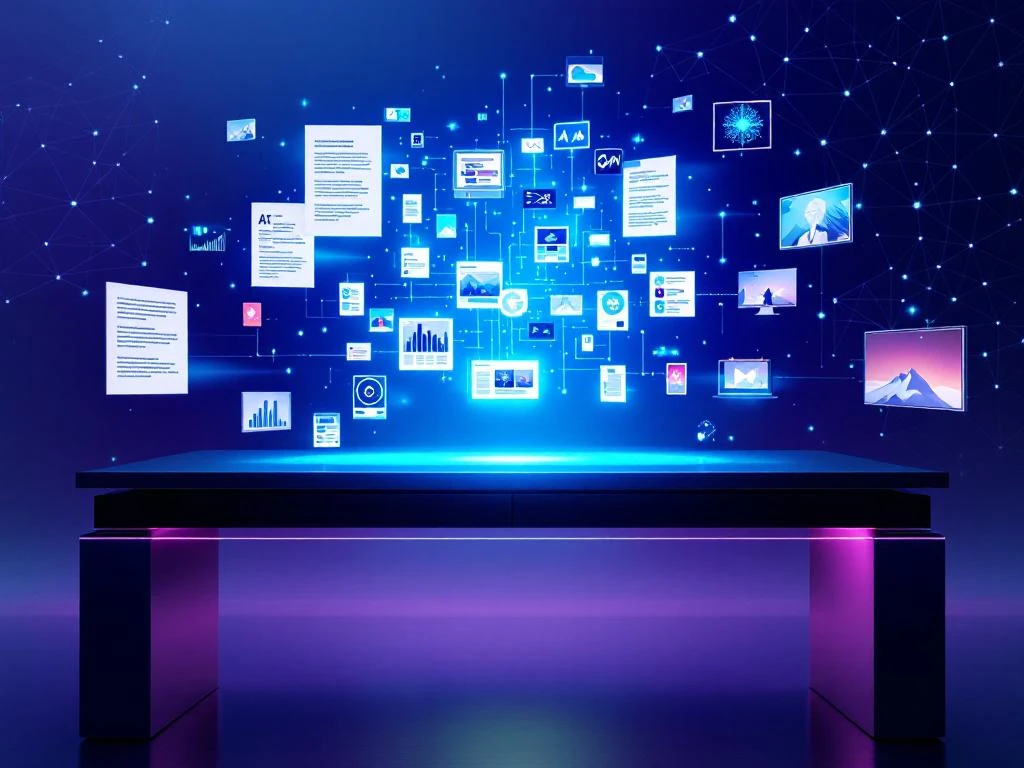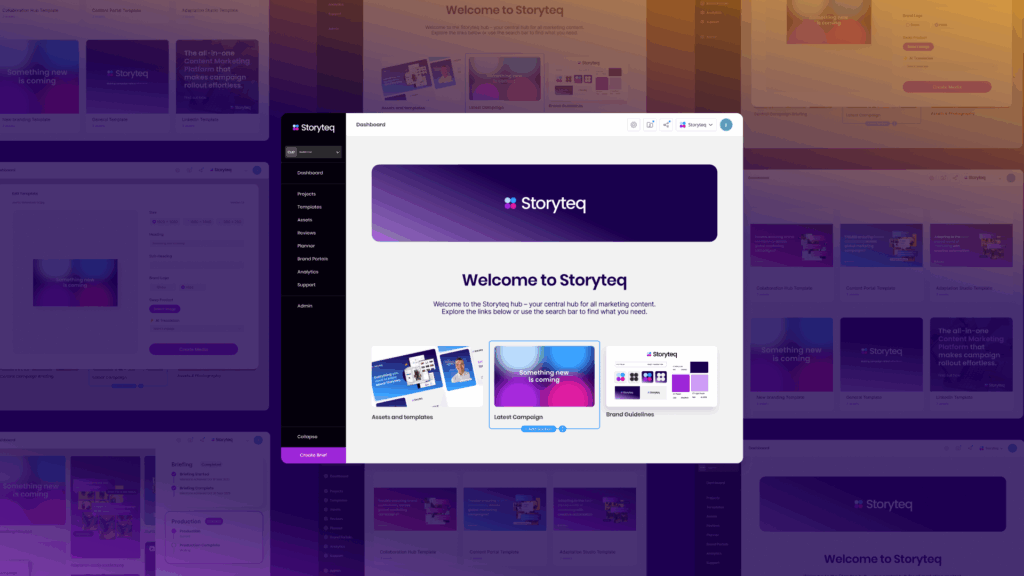AI content generation is poised for transformative growth by 2025, evolving from basic text generation to sophisticated creative production systems. These advanced AI systems will enable hyper-personalized content at scale while maintaining brand authenticity. The technology will streamline workflows by automating routine tasks, allowing marketing teams to focus on strategy and creative direction. While AI-generated content quality will rival human work in many areas, ethical frameworks and transparency requirements will shape implementation. Marketing teams that adapt their structures and skills to collaborate effectively with AI systems will gain significant competitive advantages in content production speed, personalization capabilities, and creative output.
How will AI transform content creation workflows by 2025?
By 2025, AI will revolutionize content creation workflows by automating repetitive tasks, enabling rapid iteration, and facilitating seamless collaboration between human creatives and AI systems. This transformation will dramatically reduce the time from concept to publication while maintaining brand consistency across all channels.
The most significant workflow change will be the shift to AI-powered templates that automatically adapt content for different formats, audiences, and platforms. Rather than manually creating each content variation, marketers will build dynamic templates that AI can adjust instantly, transforming one master design into hundreds of personalized versions optimized for specific channels and markets.
Integration with existing marketing systems will become more sophisticated, with AI content generators connecting directly to content management systems, digital asset management platforms, and analytics tools. This integration will create a continuous feedback loop where performance data informs content creation, making each iteration more effective than the last.
Human-AI collaboration will evolve from simple prompting to true partnership. Content teams will develop specialized skills in directing AI systems, focusing on strategic oversight while AI handles execution. This collaborative approach will allow teams to produce more content without sacrificing quality or brand consistency, addressing the growing demand for personalized content despite limited resources.
For marketing teams struggling with increasing content demands, implementing AI-driven workflows will be essential for staying competitive in 2025 and beyond. These systems will enable rapid scaling of content production while freeing human talent to focus on creative strategy and audience insights.
What role will personalization play in AI-generated content?
Personalization will become the cornerstone of AI-generated content by 2025, enabling brands to deliver individually tailored experiences at scale without overwhelming their creative teams. AI systems will leverage customer data to produce highly relevant content that resonates with specific audience segments across all marketing channels.
The most advanced AI content systems will enable hyper-personalization by analyzing customer behaviors, preferences, and contextual factors to generate content that speaks directly to individual needs. Rather than creating a few generic messages, brands will use AI to produce thousands of variations that reflect subtle differences in audience characteristics, from demographic factors to real-time behavioral signals.
This level of personalization will extend beyond simple text variations to include visual elements, tone, and message structure. AI will automatically select appropriate images, adjust colour schemes, and modify content length based on audience preferences and consumption habits. For example, the same promotional campaign could generate visually rich content for social media users who engage with images, while producing text-focused variations for those who prefer detailed information.
Maintaining authentic brand voice amid this personalization will be a critical challenge. Successful AI implementation will require establishing clear brand guidelines and tone parameters that the AI must follow while personalizing content. Companies that develop strong frameworks for balancing automation with brand authenticity will achieve the most effective results.
The shift toward AI-driven personalization represents a fundamental change in content strategy—moving from creating a few high-quality pieces to developing systems that automatically generate personalized content at scale. This approach will help brands meet growing consumer expectations for relevant, tailored experiences without expanding their creative teams.
How will AI content quality compare to human-created work?
By 2025, the quality gap between AI-generated and human-created content will narrow significantly, with AI producing professional-standard content across multiple formats. The most advanced AI systems will create content that meets or exceeds mid-level professional quality in many applications, particularly for standardized content types.
Natural language processing capabilities will reach new heights, with AI generating contextually nuanced content that demonstrates sophisticated understanding of tone, style, and audience expectations. These advancements will enable AI to produce increasingly natural-sounding text that maintains coherence and relevance across longer formats. The improvement will be particularly noticeable in AI’s ability to maintain logical flow and thematic consistency throughout extended content pieces.
Visual content generation will see similar advancements, with AI creating custom imagery and video content based on specific brand guidelines and marketing objectives. These systems will move beyond simple image manipulation to generating original visual assets tailored to campaign needs, though human oversight will remain important for creative direction and quality control.
Despite these improvements, human creativity will remain essential in several key areas. AI will excel at executing within established parameters but will still struggle with truly innovative thinking, emotional intelligence, and cultural nuance. The most effective content strategies will combine AI’s efficiency and consistency with human creativity, using AI to handle production tasks while human teams focus on developing original concepts, storytelling approaches, and emotional connections.
The organizations that thrive in this environment will be those that understand both the capabilities and limitations of AI content systems, using them strategically to enhance human creativity rather than replace it. This complementary approach will enable marketing teams to achieve unprecedented content scale and consistency while maintaining the creative spark that drives audience engagement.
What ethical considerations will shape AI content generation?
Ethical frameworks and regulatory requirements will significantly influence how brands implement AI content generation systems by 2025. These considerations will range from transparency about AI involvement to ensuring content is free from bias and represents diverse perspectives authentically.
Disclosure requirements will likely become more standardized, with brands needing to clearly indicate when content has been partially or fully generated by AI. This transparency will be essential for maintaining consumer trust and complying with emerging regulations. Organizations will need to develop clear policies about when and how they disclose AI involvement in content creation, particularly for thought leadership and editorial content where authorship carries specific expectations.
Bias mitigation will be another critical ethical consideration. AI systems reflect the data they’re trained on, potentially perpetuating or amplifying existing biases. Leading organizations will implement rigorous testing protocols to identify and address potential biases in AI-generated content, ensuring their automated systems produce inclusive, culturally sensitive material that represents diverse perspectives appropriately.
Data privacy concerns will also shape AI content implementation, as personalized content generation relies heavily on customer data. Brands will need to balance the benefits of personalization against privacy considerations, developing transparent data usage policies and obtaining appropriate consent for AI-driven personalization efforts.
Copyright and intellectual property questions will continue to evolve as AI systems become more sophisticated. Organizations will need clear guidelines about how AI can appropriately reference or build upon existing content without infringing on rights or plagiarizing original work.
The most successful implementations of AI content generation will address these ethical considerations proactively, building responsible practices into their systems from the beginning rather than adding them as afterthoughts. This approach will not only ensure compliance with emerging regulations but also build greater trust with audiences who increasingly value ethical business practices.
How will AI change marketing team structures and skills?
As AI handles more routine content creation tasks by 2025, marketing team structures will evolve significantly, with new roles emerging and existing positions shifting toward strategic oversight and creative direction. This transformation will require teams to develop new skills while adapting their workflows to maximize the benefits of AI collaboration.
The most notable structural change will be the rise of AI orchestration roles that bridge technology and creative disciplines. These specialized positions will focus on directing AI systems, providing the right prompts and parameters to generate effective content, and ensuring the output meets brand standards. While traditional content creation roles won’t disappear, they’ll evolve to emphasize concept development, creative direction, and quality control rather than production execution.
Strategy roles will gain importance as teams shift from executing individual content pieces to designing systems that automatically generate content at scale. Strategic thinkers who can develop comprehensive content frameworks and define clear parameters for AI systems will become increasingly valuable. These professionals will need to understand both creative principles and technical capabilities to establish effective guidelines for AI content generation.
Technical skills will become more important across marketing departments, with team members needing at least basic understanding of how AI content systems work and how to optimize their output. This doesn’t mean everyone needs to become a programmer, but familiarity with AI capabilities, limitations, and best practices will be essential for effective collaboration.
Perhaps most importantly, human creativity will remain vital but will be applied differently. Instead of creating individual content pieces, creative professionals will develop innovative concepts, storytelling approaches, and brand experiences that AI can then execute across various formats and channels. The ability to direct and enhance AI output will become as important as creating original work from scratch.
Organizations that thrive in this environment will develop hybrid teams that combine technical expertise with creative vision, establishing clear processes for human-AI collaboration that maximize the strengths of both. They’ll also invest in ongoing skills development to help team members adapt to rapidly evolving AI capabilities and find their most valuable roles in this new ecosystem.
To learn more about how AI-powered creative automation can transform your content production capabilities and help your team prepare for the future of marketing, request a personalized demonstration of our platform. We’ll show you how our technology can help your team create more personalized content at scale while maintaining brand consistency across all channels.



